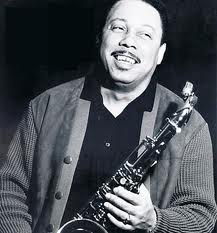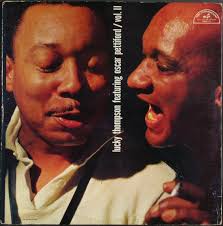Plain But The Simple Truth – Eli "Lucky" Thompson
After a dramatic introduction, a playful tutti melody (with bass). Our lead sheet editions cover both Lucky Thompson's original trio recording (tenor sax, bass, guitar) and our standard quartet instrumentation recording. We also have Minus You tracks for all instruments available from the quartet recording.
- Recording: Lucky Thompson - Featuring Oscar Pettiford, Vol. 2
- Recorded on: December 11, 1956
- Label: ABC-Paramount (ABC 171)
- Concert Key: B-flat
- Vocal Range: , to
- Style: Swing (medium)
- Tenor Sax - Lucky Thompson
- Bass - Oscar Pettiford
- Guitar - Skeeter Best
- Description
- Historical Notes
- Solos
- Piano Corner
- Bass Corner
- Drum Corner
- Guitar Corner
- Inside & Beyond
- Minus You
The tenor sax lead sheet comes from Lucky Thompson's original recording and has his articulation and melody interpretations, while the other melody parts are as recorded on the jazzleadsheets.com quartet recording.
In 1956, Lucky got his own leader date for ABC-Paramount. His first session (January 24, 1956) featured the same trio on four selections and was released under the title "Featuring Oscar Pettiford," but called Volume 1. The December 11 session started Volume 2. Of the four compositions recorded on that session, The Plain But The Simple Truth is one of three Thompson compositions that feature Lucky and Oscar playing the melody. Another very interesting fact about December 11 is that Lucky also recorded six tracks that day on a Louis Armstrong session with the Sy Oliver Orchestra.
Bassist Martin Wind
Links to more information on Lucky: an article by Noal Cohen and Chris Byars, and Noal Cohen's Lucky Thompson Discography.
Both B-flat and C treble clef editions of this great Lucky Thompson solo are available, showing his articulation. He has great tongue control which gives him the ability to articulate many of the notes in his intricate lines.
This composition comes from a very important recording of the great Lucky Thompson playing tenor sax in a trio with Oscar Pettiford on bass and Skeeter Best on guitar. This particular tune is a great blues head in B-flat, but it's a definite challenge for a bassist.
After the introduction, the bass plays the melody along with the tenor sax. Practicing along with the original track is a great way to work on this one.
Related Songs
Email Send Plain But The Simple Truth to a friend
- Recording: Don Sickler - Don Sickler Quartet featuring Daryl Johns
- Recorded on: January 31, 2010
- Label: jazzleadsheets.com (JLS 1001)
- Concert Key: B-flat
- Vocal Range: , to
- Style: Swing (medium)
- Flugelhorn - Don Sickler
- Piano - Michael Cochrane
- Bass - Daryl Johns
- Drums - Steve Johns
- Description
- Historical Notes
- Solos
- Piano Corner
- Bass Corner
- Drum Corner
- Guitar Corner
- Inside & Beyond
- Minus You
On January 31, 2010, jazzleadsheets.com started recording The Lucky Thompson Project at Rudy Van Gelder's Englewood Cliffs studio. In the previous October, the 2009 Thelonious Monk International Bass Competition had introduced Don Sickler to a remarkable young bassist, thirteen-year-old semifinalist Daryl Johns.
Don said: "From the very first notes I heard him play, I knew Daryl was someone special. At the party at the end of that competition, I told Daryl and his parents to look for a call from me soon, that I was going to go home and figure out a project for Daryl. Lucky Thompson's Oscar Pettiford project was one of the first things I came up with. I knew this would be a real test for a thirteen-year-old. I put the music together, called Daryl's father, drummer Steve Johns, and their good friend and mine, pianist Michael Cochrane, and we decided on a rehearsal day. The rehearsal with Daryl absolutely knocked me out! Three months later, we recorded our quartet versions of four of Lucky's compositions that had originally also featured bassist Oscar Pettiford."
Several other titles were recorded on this session.
This second arrangement is from Don Sickler's quartet featuring the great young bassist Daryl Johns. The tempo is pretty much the same as the original recording, but it's always nice to have an alternate version to practice along with. The added perk here is that we've created a Minus You track without the bass, so you can practice along with the trumpet, piano, and drums. YOU are the only bassist.
Bassist Dave Robaire can be seen playing along with the Quartet track, the Minus Bass version, trying to lock in with the melody and soloing.
Check out the video of saxophonist Elijah Shiffer using the Minus You track: he's the only melody instrument, and he has the solo section all to himself.
minus you: Our quartet "Lucky Thompson Project" recording clip is also available as MP3s minus each recorded instrument. Here's the recording format: [number of choruses]
-- intro
-- melody [2 choruses]
-- instrumental solo [4 choruses](flugelhorn on recording)
-- piano solo [4 choruses]
-- bass solo [3 choruses]
-- fours [4 choruses] -instrumental soloist exchanges with drums
-- out melody [2 choruses]
-- coda Each edition comes with the [minus you] format on page two. See below for details.
MP3 minus melody practice editionmelody (this track works for any solo instrument) [minus you] for the entire original track (check out our video of alto saxophonist Elijah Shiffer playing with the whole track)
-- count off sets up the solo bass pickups for the intro
-- the melody is a feature for instrumentalist and bass playing the melody together
-- melody instrument solo:
4 choruses with full rhythm section
4 choruses with only bass and drums
3 choruses with only piano and drums
then start 4 choruses of fours with drums when the rhythm section re-enters
-- out melody featuring you and bass going to the coda
performance edition: solo 4 choruses, then 4s with drums
MP3 minus Piano (there is a separate Piano part edition):
-- count off sets up the solo bass intro pickups
-- comp for the intro and melody piano and flugelhorn solo
-- take a solo (accompanied by bass and drums) 4 choruses
-- comp for the bass solo
-- comp for fours between flugelhorn and drums
-- comp the out melody and coda
MP3 minus Bass bass (there is a separate Bass part edition):
-- count off sets up the intro, which starts with bass pickups
-- melody: duo featuring bass and flugelhorn
-- walk for flugel and piano solos
-- take a solo (with piano and drums accompaniment) 3 choruses
-- start walking for fours (flugelhorn and drums)
-- out melody (play melody with flugelhorn) then coda
MP3 minus Drums
Mallets were used on the original recording for the intro and coda. The rest of the original recording was all brushes. You can also obviously try it with sticks, or switching from brushes to sticks, etc. You may prefer to get the Piano edition as your part, but any other edition could also be used.
-- count off sets up the solo bass intro pickups
-- comp for the intro and melody
-- comp for flugelhorn drums, piano and bass solos
-- trade fours with the flugelhorn for 4 choruses (finger snaps have been added on "2 and 4" for the drum solo sections)
-- comp the out melody and coda.
Related Songs
Email Send Plain But The Simple Truth to a friend

Eli "Lucky" Thompson
June 16, 1923 – July 30, 2005
Saxophonist Lucky Thompson is one of the great treasures of jazz. He was born in Columbia, South Carolina, but was raised in Detroit, Michigan. He played in local groups with Hank Jones, Sonny Stitt and others. In August, 1943, when he was 19, he left Detroit with Lionel Hampton's Orchestra, eventually arriving in New York City. Still a teenager, his first recording date was with Hot Lips Page on March 18, 1944. Later in 1944 he started recording with both Lucky Millinder and Count Basie. Read more...





